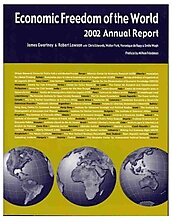The foundations of economic freedom are personal choice, voluntary exchange, and open markets. As Adam Smith, Milton Friedman, and Friederich Hayek have stressed, freedom of exchange and market coordination provide the fuel for economic progress. Without exchange and entrepreneurial activity coordinated through markets, modern living standards would be impossible.
Potentially advantageous exchanges do not automatically occur. Their realization is dependent on the presence of sound money, rule of law, and security of property rights, among other factors. Economic Freedom of the World seeks to measure the consistency of the institutions and policies of various countries with voluntary exchange and the other dimensions of economic freedom.
The 2002 report, which is based on data from 2000, lists Hong Kong as the freest economy in the world, followed closely by Singapore and the United States. The United Kingdom, Switzerland and New Zealand round out the top five.
This edition of Economic Freedom of the World also includes a preface by Nobel laureate Milton Friedman.
A full-text version of the report is also available online in Adobe Acrobat PDF format.
